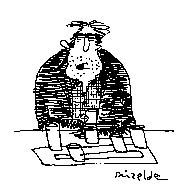The phenomenon I’m about to describe will be infuriatingly familiar to older readers, but will have been encountered by people of any age. Even in childhood we meet it, and as we grow old it happens more and more often. So common is the experience that it would surprise me if there was any language and culture that lacked an idiomatic expression to describe it. Spanish certainly has one: ‘En la punta de la lengua.’ So does French: ‘Sur le bout de la langue.’
The Poles, I’m told, say ‘Na koncu jezyka.’ In Wales they say ‘Blewyn tasod.’ All these idioms refer to the same thing. In English the curious phrase finds more than a million references in Google. The phrase is: ‘On the tip of my tongue.’
The Welsh say it’s a hair on their tongue; the Germans say it lies on their tongue; the Russians say it’s spinning on their tongue. The French and Spanish idioms are an almost literal translations of ours. And we all mean the same thing: a name, a word, a melody… something in the memory that we know is there, which we feel is there, but which we cannot for the moment retrieve.
I’m using the idiom in this precise and very sharply focused sense: not to describe something we ought to know but seem to have forgotten (my engagements for next Tuesday evening, for instance); nor to describe something we can be sure is buried somewhere in memory because we did once know it, but which we cannot seem to locate (the date of the accession of Henry IV of France, perhaps). Tuesday’s engagements, and Henry’s accession, certainly do lie somewhere in my brain, but I know this only because I know they were once placed there: the evidence of their existence is to be found by reference to another, verifiable, event. But that does not mean I shall ever be able to find them again or have any idea where to look.
But to have something on the tip of the tongue is a feeling, not a piece of intellectual knowledge. The evidence of this item’s existence is a most peculiar sensation. Something is placed where you can see it — or at least its outline — but just beyond your reach, your closer inspection. It’s as if some kind of self-sabotage is at work, or perhaps self-mockery. So powerful is this sense of having it almost to hand, that you feel emboldened to state with confidence that should anyone else reveal it, then you will immediately recognise it as the thing you were looking for.
Indeed when we say in tones of acute frustration: ‘Ooh — his name’s just on the tip of my tongue… it’s almost there… no, no, hold on — don’t say it — I know it; it’ll come to me…’, we can be sure that if anyone blurts out a name, or word, or melody, but the wrong one, we’ll know at once it’s wrong.
Now isn’t that really very odd? To be able to say no to all the wrong answers must surely be to possess a template with which they are being compared and found wanting — how else can you know the proffered answer doesn’t fit except by trying the fit? Yet we cannot say what it doesn’t fit. Likewise, if we search for our place in a book we’re reading, we couldn’t in a million years recall the last sentence we read — yet we can find it! So we must know it, mustn’t we?
I have for decades been thinking through possible explanations for this mystery. I’ve tried the analogy of the IT archive which might (say) have the facility to notify you that a document had been located, but that a technical glitch was blocking its retrieval — but this analogy doesn’t explain the very clear feeling we have that the item has indeed been retrieved, and the faculty we have to confirm at once — when candidates are proposed — whether they are indeed the one.
Sometimes (don’t you find?) you can cheat this blocking demon by creeping up sideways on your quarry. The technique is to stop trying to remember it, transfer your attention elsewhere, then pounce by returning suddenly to your original quest and swatting your quarry like a fly — before it has had time to fly away. The item being hunted becomes easier to spot from the corner of your eye, yet blanks out when stared at full-on.
We’ve all, surely, had the experience of abandoning the mental hunt for something we suspect is located somewhere in the memory, only to find ourselves — after we’d given up trying to remember — waking in the middle of the night (or diverted in the middle of an entirely unrelated train of thought) as the desired item pops, unsought, into our consciousness. I used to explain this to myself as being a function of unconscious thought-processes: failing to find the thing we want at the time we want it, we give some subterranean filing clerk or search-engine more time to work on the problem while we ourselves turn to something else. When the item is retrieved, a kind of ping goes off in the brain (like those pings that alert you to an incoming email) to let us know the search has been successful.
But this fails to account for the unmistakable sensation that the search has already been successful — but that whomever or whatever has located our quarry is damned if he/it is going to show us what’s been found.
I’ve looked, too, for a Darwinian approach. Is it useful to an animal to know that he knows a thing, even while he can’t quite put his finger on the thing he knows? Hardly. Once we’ve got to the ‘it’s right on the tip of my tongue’ stage, most of the work has been done, and for want of one final internal click, most of the reward is being denied us. What Darwinian explanation could there be for that inefficiency? Besides, as the problem afflicts us more as we age, the suspicion must be that a malfunction or degradation of the brain is responsible. Could there be some kind of a neurological design fault so that, after heavy wear, the system keeps tripping out at the critical moment?
I’ve looked, finally, at what just might be a related syndrome: the fear of blanking that actually causes the blank. Which of us has not suffered this? By staring too anxiously at an imminent need to retrieve something, we cause it to swim from vision. This terrifying experience has come close to persuading me that we are inhabited by an evil alter-ego determined to thwart us and bring us down. But is the true explanation not so much Manichean or psychoanalytic as neurological? Two nerves, two bits of wire, insufficiently insulated from each other?
Long familiarity with the fact — and the problems — of recognition may be distracting us from how very, very strange a faculty it is that we need to explore. The tip-of-the-tongue syndrome might just be a way in.
Matthew Parris is a columnist on the Times.







Comments